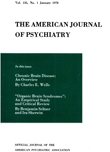Treatment of persons found incompetent to stand trial
Abstract
Persons found incompetent to stand trial comprise the largest group of psychiatric patients committed to mental hospitals through the criminal justice system in the United States. The law dictates that these patients receive short-term treatment aimed specifically at enabling them to stand trial with as little delay as possible. The author describes the treatment and assessment aspects of a program that admits approximately 200 trial-incompetent persons each year. During 1978, 90% of the 205 patients discharged from this program were certified by the treatment staff as competent to stand trial; 97.5% of that group subsequently completed the trial process.
Access content
To read the fulltext, please use one of the options below to sign in or purchase access.- Personal login
- Institutional Login
- Sign in via OpenAthens
- Register for access
-
Please login/register if you wish to pair your device and check access availability.
Not a subscriber?
PsychiatryOnline subscription options offer access to the DSM-5 library, books, journals, CME, and patient resources. This all-in-one virtual library provides psychiatrists and mental health professionals with key resources for diagnosis, treatment, research, and professional development.
Need more help? PsychiatryOnline Customer Service may be reached by emailing [email protected] or by calling 800-368-5777 (in the U.S.) or 703-907-7322 (outside the U.S.).



